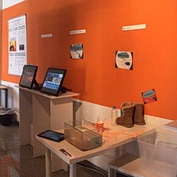- Details
- Written by Anna-Leena Kähkönen, University of Jyväskylä
The IRRESISTIBLE topic for Finland this year was climate change prevention and accommodation. The 12-year-old pupils at local schools in Jyväskylä prepared video newscasts and made animations to be shown at the Natural History Museum of Central Finland, atop the hill of Harju at the very center of the city. While the permanent exhibits recount the history of the land all the way from the Ice Age and showcase the various species that inhabit the many forests and lakes of the area, the museum was eager to add a new part to their collection.
- Details
- Written by Gabriel Gorghiu, Valahia University Targoviste
In the context of the proposed activities included in one Romanian Unit entitled: “Nanosciences - A Facilitator Context for a United Collective”, the students are introduced to the concept of nanometals, trying to understand their specificity, and using green methods for obtaining some colloidal nanoparticles (Au and Ag) from plant extracts, synthesized also by them. The activities are conducted in interdisciplinary “research teams” who have the tasks to gain knowledge about nanometals and their applications in medicine, environmental protection, industry etc., raising so the importance of Science Education in their everyday life.
Read more: RRI in the romanian unit “nanosciences - a facilitator context for a united collective”
- Details
- Written by Christina Troumpetari, Eugenides Foundation
What is Nanotechnology? What are the applications of Nanotechnology? What relation may have the research, technology and nanomaterials ... with “engagement”, ‘’gender equality’’, ‘’science education”, “open access”, "ethics" and “governance”?
Greek Pupils of 6th grade and secondary education students with their teachers undertake to explain to us all the above with a simple, understandable and enjoyable way through interactive games...digital posters, experiments, hands-on and playful activities, even origami!
- Details
- Written by Sevil Akaygün, Bogazici University
Engagement
Based on the overarching scenario, the module starts with a video of news broadcasted on a local TV channel. The news points out the increase in the number of cross infections in the hospitals, and its threat to human health. Right after the video, teacher initiates a discussion about the possible reasons of the spread of diseases stemming from the cross infection.
- Details
- Written by Rita Marques, Universidade de Lisboa
In designing an exhibit, or a narrative/inquiry focused dialogue to accompany an exhibit, students would need to consider how the exhibit gets the audience thinking about issues of Responsible Research and Innovation. In the process of either creating an exhibit or modifying an existing exhibit the emphasis would be on eliciting personal reflection by those engaging in the exhibit.
Read more: the potential of student planned and designed exhibitions - empowering students









